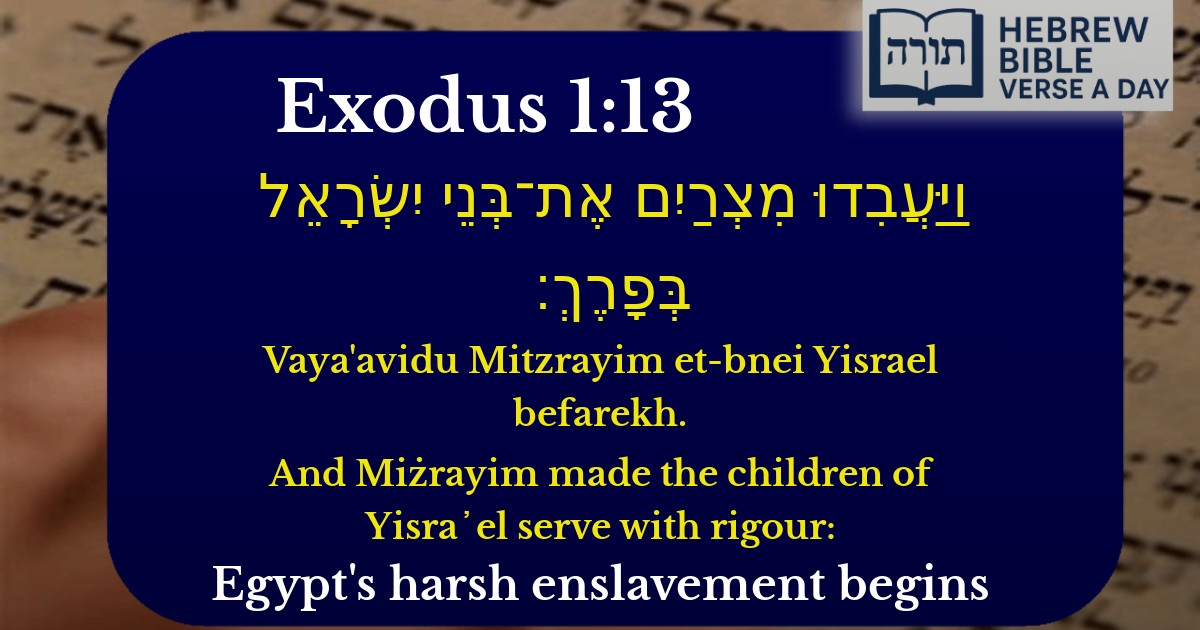Frequently Asked Questions
Q: What does 'serve with rigour' mean in Exodus 1:13?
A: The phrase 'serve with rigour' (בְּפָרֶךְ) refers to the harsh and oppressive labor the Egyptians imposed on the Israelites. Rashi explains that this means the work was backbreaking and designed to break their spirits. The Midrash (Shemot Rabbah 1:11) adds that the Egyptians intentionally gave them pointless tasks, like building walls only to tear them down again, to increase their suffering.
Q: Why did the Egyptians enslave the Israelites so harshly?
A: According to the Torah (Exodus 1:9-10), Pharaoh feared the growing Israelite population might side with Egypt's enemies. The Rambam (Hilchot Avadim 1:7) explains that oppression often stems from fear and a desire to control. The Midrash (Shemot Rabbah 1:10) also teaches that this harsh treatment was part of the divine plan to prepare the Israelites for their eventual redemption.
Q: What lesson can we learn from the Israelites' suffering in Egypt?
A: The Talmud (Berachot 5a) teaches that suffering can refine a person and bring them closer to Hashem. The Israelites' hardships in Egypt ultimately led to their redemption and receiving the Torah. This teaches us that challenges can have a greater purpose, even if we don't see it immediately. The Sages also derive from this verse the importance of remembering our history to appreciate freedom and treat others with compassion.
Q: How does the concept of 'rigorous labor' apply to our lives today?
A: The Baal Shem Tov taught that just as physical labor in Egypt refined the Israelites, our daily struggles can refine our character. The verse reminds us to persevere through difficulties while maintaining faith. Additionally, the Chofetz Chaim notes that this teaches us to be sensitive to others' suffering and oppose oppression in any form, as we experienced it firsthand in Egypt.
Q: Why is this verse important in Jewish tradition?
A: This verse is foundational to understanding the Exodus story, which is central to Jewish identity. We recall it daily in prayers and annually at Passover. The Ramban explains that remembering our slavery helps us appreciate freedom and motivates us to follow mitzvot. The Seder's maror (bitter herbs) directly connects to this verse's description of bitter oppression.


Meaning of "בְּפָרֶךְ" (With Rigour)
Rashi explains that the term "בְּפָרֶךְ" refers to backbreaking labor, derived from the root "פרך", meaning "to break" or "to crush." The Egyptians imposed harsh and oppressive work upon Bnei Yisrael, intending to physically and spiritually break them.
The Nature of the Oppression
The Talmud (Sotah 11b) elaborates that Pharaoh decreed that the Israelites should perform useless labor, such as building structures only to tear them down again, to maximize their suffering. Rambam (Hilchos Avadim 1:7) notes that this type of servitude was designed to humiliate and exhaust them beyond normal labor expectations.
Spiritual Dimension of the Servitude
The Midrash (Shemos Rabbah 1:11) teaches that the Egyptians sought not only to physically enslave Bnei Yisrael but also to distance them from their faith. By forcing them into relentless labor, they aimed to prevent them from observing mitzvos and maintaining their Jewish identity.
Divine Purpose Behind the Suffering
Halachic Implications
The Ramban (Shemos 1:13) connects this verse to the prohibition of oppressing a fellow Jew (Vayikra 25:43), emphasizing that the Torah forbids any form of harsh servitude reminiscent of Egypt. This serves as a moral lesson against exploitation and cruelty.